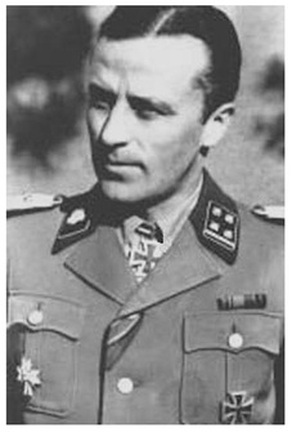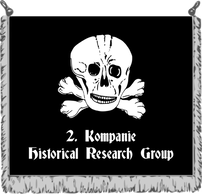awards
|
promotionsUnder Construction.
|

Erich Eberhardt was born in Wiesbaden on the 1 October 1913. In 1931 he joined the Hamburg police force. He then was one of the early members of the SS, which he joined in 1934 and was given the SS service number 272,747. He became a party member and his Nazi Party Number was 4,178,022.
His first unit was the 8. Kompanie, SS-Standarte 'Germania'. In 1936 he was selected to become an officer and sent to the SS-Junkerschule at Braunschweig, being promoted to Untersturmführer upon graduation.
At the start of World War II, Eberhardt was an SS-Hauptsturmführer and company commander of the 12. Kompanie, 9.SS-Grenadier-Regiment, SS-Division "Wiking".
During the invasion of the Soviet Union (Operation Barbarossa), he was awarded the Iron Cross 2nd class in July 1941 and the 1st class award in September 1941.
Eberhardt was posted to the 7.SS-Gebirgsjager-Division "Prinz Eugen" between March 1942 to June 1943, as an officer of the General Staff.
He was then posted to the General Staff of the 3.SS-Panzer-Division "Totenkopf" in October 1943 and was promoted to Obersturmbannführer in April 1944.
Erich Eberhardt was awarded the Knight's Cross for his actions in July 1944, when the 3.SS-Panzer-Division "Totenkopf" was called forward by Field Marshal Model after the Russians had broken the German front and the army was in retreat.
As the Divisional commander had not yet arrived, Eberhardt as the Divisions IA, deployed the Division which succeeded in holding the line and while reconnaissance had revealed a strong Russian Armoured and Cavalry Corps advancing and threatening Grodno which would leave the south open to any assault.
The next morning Eberhardt decided to act independently, and ordered the Totenkopf to advance. In the area west of Grodno they managed to infiltrate the Russian lines and attacked the Russian flank, which forced the Armour and Cavalry units they were facing to contract and break up.
The Army Group now ordered a general push north and five Russian divisions were cut off and destroyed and the front stabilised. For his part in this action Eberhardt was awarded the Knight's Cross on the 23 August 1944.
-------------------------------------------------------------------------------
An excerpt from the History Division of the SS-Panzer-Division "Totenkopf":
Field Marshal Model, called the SS Totenkopf Division, which was laid on 6/25/44 at railway march to the north. At 07:07:44 the last parts were unloaded in the space of Grodno. The German front line was no longer there, only retreating, partly leaderless organizations.
Ostubaf. Eberhard led the march as Ia, movement and the subsequent use of the Division alone, as the Divisional Commander had not yet arrived. The associations successively arriving one wanted to assume higher place. Eberhardt succeeded his units to escape this attempt and kept the Division closed in hand.
Model determined the division as operational reserve. Own the facts showed that strong Russian Federations, one tank corps and cavalry are on the rise towards Lyk. In Grodno the enemy attempted to cross the Niemen. The cornerstone of Grodno threatened to collapse. The south front was to be torn in danger. The Russian breakthrough peaks had already gone into combat contact with the hedgehog position army staff. notification Despite this enemy situation, the division received no application command.
Eberhardt decided to act independently. In the morning he took the SS Totenkopf Division from South to Northern. The penetrated into the western part of Grodno enemy was thrown back over the Niemen and the main thrust out into the flank of the enemy, while spinning off parts of the west and built a defensive front. The flank attack caused a turning back of the West advanced and now cut armor and cavalry organizations.these were intercepted and destroyed by the reinforced tank regiment. By evening, the gap north of Grodno was closed to within a few kilometers.
The connection with the attacking 5 Panzer Division was not yet established. Now, however, the Army Group commanded the advance to the north in order to close the gap entgültig.
During the night came Stubaf. Pitschellis with the increased Panzerjägerabteilung to attack. He broke through the enemy forces and set connection to the northern neighbors. Five enemy divisions were thus prevented from escaping and stabilizes the defensive front. Eberhard and Pitschellis were honored on August 23, 1944 for the Knight's Cross of the Iron Cross.
------------------------------------------------------------------------------
The division was fighting up to the last days of the war. On 9. Mai, 1945, the negotiations for surrender of the "Totenkopf" Division took place in Pregarten. Eberhardt gave the general instruction " freedom of movement to the West "and wanted the members of the Division saved from the Russian captivity, which later turned out to be a fallacy. The Americans handed the Division over to the Russians.
Eberhardt broke out of a Russian prison after a daring, adventurous escape. Erich Eberhardt was a dutiful, personally brave and exemplary soldier. His strengths were the clear objectivity, balancing the cool, the sober assessment of the situation and determination.
After the war Erich Eberhardt was a spokesman for the HIAG for the Rhineland and was on the 27 April 1963, adopted as the successor to Kurt Panzer Meyer Meyer.
Eberhardt died at Lohrheim on the 7 July 1963, from heart failure, within a year of taking officer for HIAG.
His first unit was the 8. Kompanie, SS-Standarte 'Germania'. In 1936 he was selected to become an officer and sent to the SS-Junkerschule at Braunschweig, being promoted to Untersturmführer upon graduation.
At the start of World War II, Eberhardt was an SS-Hauptsturmführer and company commander of the 12. Kompanie, 9.SS-Grenadier-Regiment, SS-Division "Wiking".
During the invasion of the Soviet Union (Operation Barbarossa), he was awarded the Iron Cross 2nd class in July 1941 and the 1st class award in September 1941.
Eberhardt was posted to the 7.SS-Gebirgsjager-Division "Prinz Eugen" between March 1942 to June 1943, as an officer of the General Staff.
He was then posted to the General Staff of the 3.SS-Panzer-Division "Totenkopf" in October 1943 and was promoted to Obersturmbannführer in April 1944.
Erich Eberhardt was awarded the Knight's Cross for his actions in July 1944, when the 3.SS-Panzer-Division "Totenkopf" was called forward by Field Marshal Model after the Russians had broken the German front and the army was in retreat.
As the Divisional commander had not yet arrived, Eberhardt as the Divisions IA, deployed the Division which succeeded in holding the line and while reconnaissance had revealed a strong Russian Armoured and Cavalry Corps advancing and threatening Grodno which would leave the south open to any assault.
The next morning Eberhardt decided to act independently, and ordered the Totenkopf to advance. In the area west of Grodno they managed to infiltrate the Russian lines and attacked the Russian flank, which forced the Armour and Cavalry units they were facing to contract and break up.
The Army Group now ordered a general push north and five Russian divisions were cut off and destroyed and the front stabilised. For his part in this action Eberhardt was awarded the Knight's Cross on the 23 August 1944.
-------------------------------------------------------------------------------
An excerpt from the History Division of the SS-Panzer-Division "Totenkopf":
Field Marshal Model, called the SS Totenkopf Division, which was laid on 6/25/44 at railway march to the north. At 07:07:44 the last parts were unloaded in the space of Grodno. The German front line was no longer there, only retreating, partly leaderless organizations.
Ostubaf. Eberhard led the march as Ia, movement and the subsequent use of the Division alone, as the Divisional Commander had not yet arrived. The associations successively arriving one wanted to assume higher place. Eberhardt succeeded his units to escape this attempt and kept the Division closed in hand.
Model determined the division as operational reserve. Own the facts showed that strong Russian Federations, one tank corps and cavalry are on the rise towards Lyk. In Grodno the enemy attempted to cross the Niemen. The cornerstone of Grodno threatened to collapse. The south front was to be torn in danger. The Russian breakthrough peaks had already gone into combat contact with the hedgehog position army staff. notification Despite this enemy situation, the division received no application command.
Eberhardt decided to act independently. In the morning he took the SS Totenkopf Division from South to Northern. The penetrated into the western part of Grodno enemy was thrown back over the Niemen and the main thrust out into the flank of the enemy, while spinning off parts of the west and built a defensive front. The flank attack caused a turning back of the West advanced and now cut armor and cavalry organizations.these were intercepted and destroyed by the reinforced tank regiment. By evening, the gap north of Grodno was closed to within a few kilometers.
The connection with the attacking 5 Panzer Division was not yet established. Now, however, the Army Group commanded the advance to the north in order to close the gap entgültig.
During the night came Stubaf. Pitschellis with the increased Panzerjägerabteilung to attack. He broke through the enemy forces and set connection to the northern neighbors. Five enemy divisions were thus prevented from escaping and stabilizes the defensive front. Eberhard and Pitschellis were honored on August 23, 1944 for the Knight's Cross of the Iron Cross.
------------------------------------------------------------------------------
The division was fighting up to the last days of the war. On 9. Mai, 1945, the negotiations for surrender of the "Totenkopf" Division took place in Pregarten. Eberhardt gave the general instruction " freedom of movement to the West "and wanted the members of the Division saved from the Russian captivity, which later turned out to be a fallacy. The Americans handed the Division over to the Russians.
Eberhardt broke out of a Russian prison after a daring, adventurous escape. Erich Eberhardt was a dutiful, personally brave and exemplary soldier. His strengths were the clear objectivity, balancing the cool, the sober assessment of the situation and determination.
After the war Erich Eberhardt was a spokesman for the HIAG for the Rhineland and was on the 27 April 1963, adopted as the successor to Kurt Panzer Meyer Meyer.
Eberhardt died at Lohrheim on the 7 July 1963, from heart failure, within a year of taking officer for HIAG.
DISCLAIMER: 2. Kompanie is a non-political organization We do not support naziism, or fascism. We are not associated with nor do we condone the actions of the Third Reich or the actual 3.SS Division.
